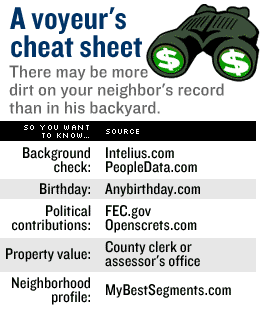NEW YORK (CNN/Money) -
Just how much do you really know about your neighbor?

Sure, the guy next door drives a five-year-old Honda and only waters his lawn on Sundays, but wouldn't you like to know how much he paid for his house? Curious as to why you never see his wife anymore, or if she is still his Mrs.?
"As scary and creepy as it is that you have access to this information, it is public record," says Don MacLeod, editor-in-chief for Internet Law Researcher and reference librarian for law firm Cadawalder, Wickersham & Taft. "It isn't something someone created on his own."
Spying on your neighbor is hardly the next best thing to bringing over milk and cookies. But from the price of a house to a person's age, nosy neighbors have an ever increasing number of tools at their disposal.
In this election season, perhaps you want to know more about someone's political leanings? The Federal Election Commission's Web site, fec.gov, lists contributions of $200 or more dating back to 1997.
You may be able to get a few records as far back as 1972, which pre-dates the FEC, if you call their Public Records Office at (202) 694-1120. Also, the Web site for the Center for Responsive Politics, opensecrets.org, lists donor contributions from as early as 1989.
You can even find out if he registered to vote by visiting your county's board of elections office. Some even post the information on their Web sites.
Same goes for home prices and property tax information. It's public information, and many counties are making this available online through their county clerk or assessor's office.
Don't expect to find out what Angelina Jolie paid for her pad -- the rich and famous often use trusts to conceal their property values. But everyday people are easier game.
Neighborhood profiles
If you are just looking for an overall neighborhood profile, MyBestSegments.com assesses an area's demographics by zip code and further divides each group based on shared lifestyle traits.
In Harlem's 10031 zip code, for example, you'll find members of the "Bohemian Mix," a racially-diverse subgroup of under-35 college-educated professionals living alongside the "City Roots," a heavily-minority subgroup of lower-income retirees.

If you're looking for the dirt in your neighbor's backyard, dig a little to learn what he did last summer after his DUI arrest -- something you may not have previously known.
Intelius.com, for example, offers a complete background check for $49.95 that includes information on bankruptcy filings, legal judgments, and a 30-year address history. A national criminal check is available for an extra $19.95 and for the really curious there's a monthly monitoring service that keeps you abreast of the latest changes for an additional $50.
Find the address and telephone number for nearly anyone you know, or want to stalk -- even if they have an unlisted number -- using their 24-hour pass for $19.95 or $7.95 for just one person.
Maybe your curiosity doesn't justify a $49.95 background check, but wouldn't you like to know if he was really old enough to remember the 1960s? Check Anybirthday.com. It's free -- and slightly addictive, although the listings are not as comprehensive as the name suggests.
There are, however, limits on the nature of information you'll be able to find on your own.
"Financial records are protected," says MacLeod. "We can't, by law, get your tax forms. To get personal credit histories, you need to have a legitimate interest."
Also, what is considered public record varies by state. Divorce records, for example, are not available to the public in New York, but they are elsewhere.
Unfortunately you have little control over public records, even if they are your own. According to Intelius.com, a court order may be necessary to seal your records. If you have an urgent privacy or security issue, the firm says, you should contact the office that handles those records to determine how, or if, you can expunge them from the public record.
Commercial search services such as Intelius.com will allow you to opt-out of their phone directory. Michelle Jordan, a spokesperson for rival PeopleData.com, suggests that you make a request every three months for companies to sweep their records.
But more often than not, as MacLeod says, these services are used to help locate old co-workers or friends rather than criminal enterprise.
"People have a natural curiosity of what became of people," he says.

|

